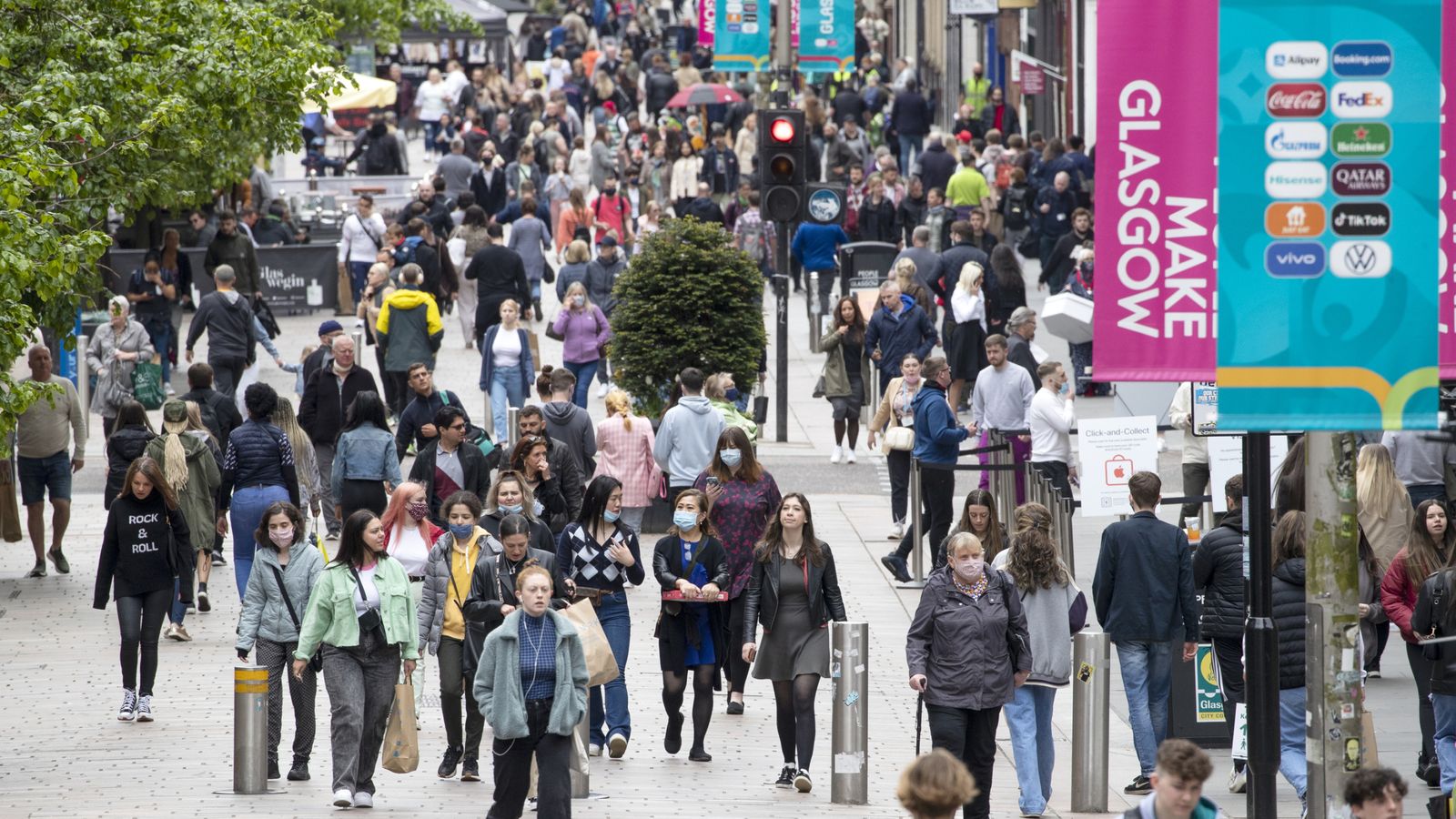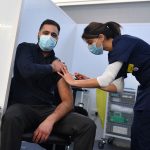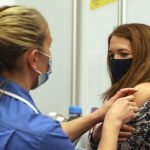Omicron is now the dominant COVID-19 variant in Scotland, as England’s R number rises to between 1.0 and 1.2.
Prime Minister Boris Johnson told Sky News on Friday that Omicron is a “very serious threat” and that the UK is seeing a “very serious wave coming through”.
In England, last week’s R number range was estimated at between 0.9 and 1.1.
Study reveals Omicron reinfection risk; ‘budget your risk’ says PM – follow COVID latest
Under the latest estimate, every 10 people infected will pass the virus to between 10 and 12 other people.
The latest growth rate is between 0% to +2% per day, meaning the number of new infections could be broadly flat.
The reproduction number (R) is the average number of secondary infections produced by a single infected person.
If the value is above 1 then the epidemic is thought to be growing
The higher the value above one then the more people a single person infects so the faster the epidemic is likely to be growing.
SAGE is no longer publishing an R number for the UK and recommends use of the number published for each nation. The UKHSA is now responsible for estimating the R number.
The R number estimates represent the transmission of COVID-19 from two to three weeks ago (so unlikely yet to be a clear indicator of the picture with Omicron), due to the time delay between someone being infected, developing symptoms, and needing healthcare.
Both the R number and growth rate are averages over different situations and give an indication of general trend, rather than the state of the epidemic.
Omicron dominant in Scotland
Meanwhile, First Minister Nicola Sturgeon said Omicron cases have been rising exponentially in Scotland, with cases doubling every two to three days.
Scotland has recorded 4,336 COVID cases in the latest 24-hour period – 696 of them being the Omicron strain.
Ms Sturgeon said the S gene indicator showed that 15.5% of cases were the Omicron variant last Friday, while today it is 54.1%, replacing Delta as the dominant strain of COVID.
More concerningly, she said the R number associated with Delta is around 1 but the R number for Omicron appears to be well over 2 and could possibly be above 4.
The first minister described the emergence of Omicron as “the cruellest of blows”, adding the situation in the country with renewed restrictions and rising infections is “really, really awful”.
She said: “The tsunami I warned about a week ago is now starting to hit us.”
But Ms Sturgeon insisted vaccination meant the country was in a “so much better position now than this time last year”.
She said: “Every booster put into someone’s arm right now is another brick in this wall of protection that I do believe will increasingly defend us against Omicron as we go into the New Year.”
More than half of all Scots over the age of 18 have already had a booster jab, but Ms Sturgeon told the public: “We want as many people as possible to get boosted by the time the bells strike on Hogmanay.”
Fresh restrictions
As well as accelerating the booster programme, she stressed the importance of slowing the spread of the virus with fresh restrictions.
From today, businesses in Scotland have a duty to take reasonable steps to reduce transmission, with measures such as physical distancing and to control the flow of customers being reintroduced, as well as support for home working.
She described measures such as limiting meet-ups to no more than three households, and taking lateral flow tests beforehand as a “safety net”.
Follow the Daily podcast on Apple Podcasts, Google Podcasts, Spotify, Spreaker
“My fundamental ask of everyone right now is this – in the run-up to Christmas stay at home much more than you normally would, and stay at home as much as you can,” she said.
“If what matters most to you is spending time with your loved ones on Christmas Day, don’t risk that by going out before then and possibly catching COVID.”
It comes after further measures were also announced by Wales’ devolved administration.
NHS overwhelmed
Ms Sturgeon also pointed out London’s rising hospitalisations due to the Omicron variant, saying: “If we don’t act now, what we have feared all along since the very start of this pandemic but so far have managed to avoid, the overwhelming of the NHS, could happen.
“That is one very important reason why slowing this down matters so much.”






















